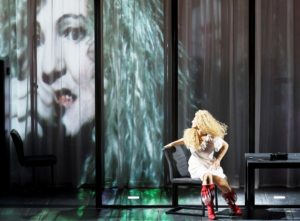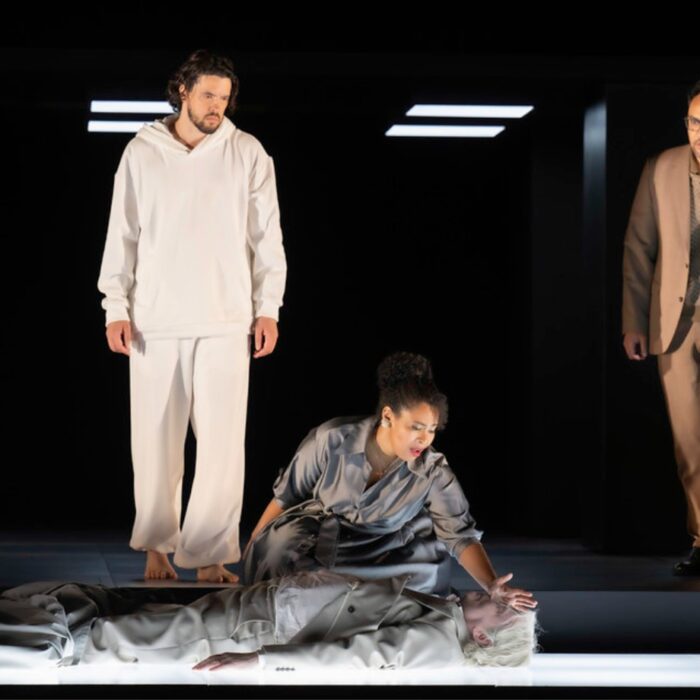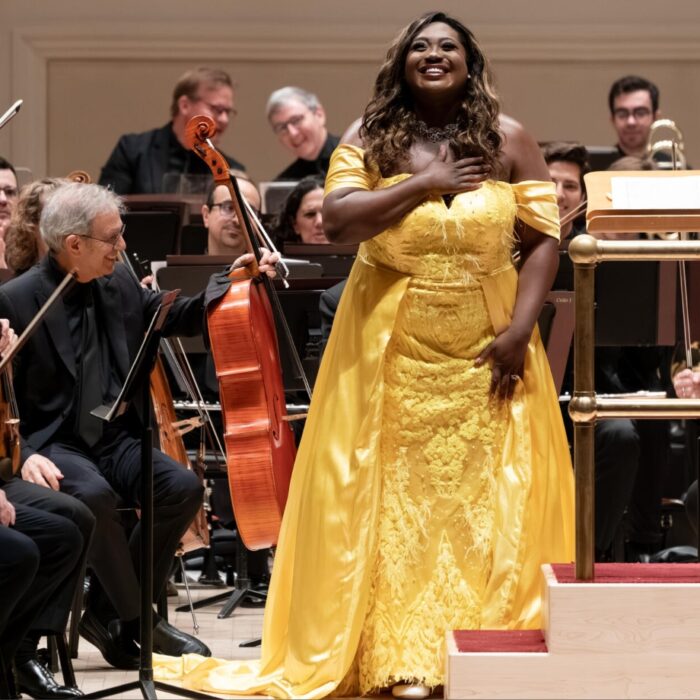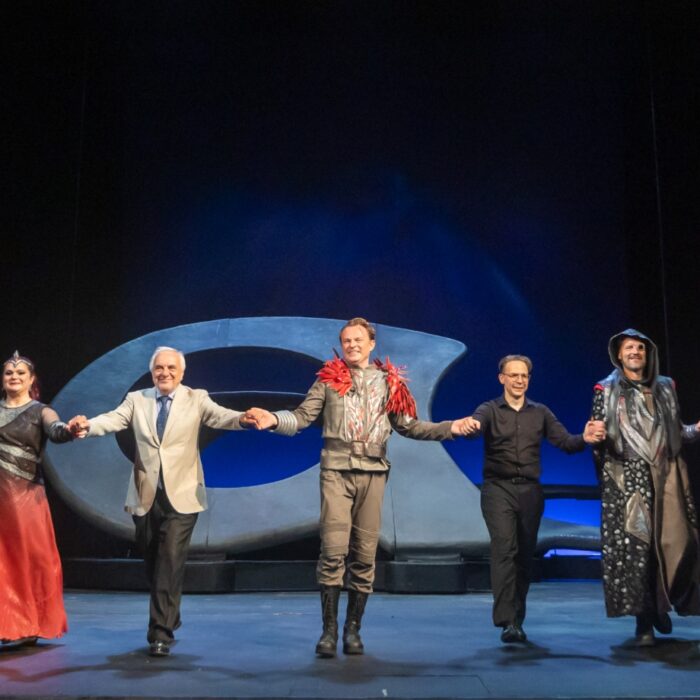
Oper Graz 2018-19 Review: Salome
Johanni van Oostrum’s superbly sung Salome saves another fatally flawed production by Florentine Klepper
By Jonathan SutherlandThe sedate, slightly sedentary city of Graz is not a place one would think of as Sodom transported to southern Austria. In 1906 however, Graz became the epicenter of psycho-sexual depravity, or at least on the stage of its opera house when Richard Strauss conducted his skandalumtost opus “Salome” a few months after its electrifying debut in Dresden.
Despite Mahler’s efforts to have the opera performed in the Austro-Hungarian capital, “Salome” was deemed far too salacious for refined Viennese sensibilities and it took another 13 years before Maria Jeritza shed her veils in the K. und K. Hofoperntheater. Not only did Strauss conduct “Salome” for the first time, but the crème de la crème of the music world were there to hear it. Puccini, Schönberg, Berg and Mahler were all part of das begeisterte Publikum. The prima of Florentine Klepper’s new production for Oper Graz 2018-19 season may not have boasted quite as many luminati of the lyric theatre, but it was none the less a revelation due to the stupendous performance of South African soprano Johanni van Oostrum in the title role.
Salome Heads To The Beach
Regrettably, van Oostrum was one of the few plus factors. The principal problem was Madame Klepper who seems obsessed with updating the time-periods of everything she touches in the dubious justification of “contemporary relevance.” “Arabella” at the Salzburg Festival in 2014 prodded the plot by a mere 50 years, but “Norma” in Graz last year port-keyed the pre-Christian Druids into 20th century crypto-revolutionaries.
“Salome” was equally discrepant. Instead of the hedonistic court of Herod Antipas c. 30 AD, Martina Segna’s confused stage design was closer to a Bermuda beach-house cum Miami mafioso bordello. There was a prominent cold-room cellar which (wrongly) seemed built to snap-freeze pesky prophets. Palazzo Herodes was inhabited by drunken free-loaders and châtelaine Herodias had doggy-style sex with one of her more comely guests.
Jochanaan was not imprisoned in a caliginous subterranean cistern but lodged in a granny flat above Herodias’ bedroom. This made no sense of Salome’s observation “Es muss schrecklich sein, in so einer schwarzen Höhle zu leben!” Instead of being dragged up from the fetid depths, Jochanaan staggered down some steps wearing grubby pajamas and struggled to free himself from his flimsy fetters and pistol-toting turnkeys. For someone who has been incarcerated in chains for some years, the violent physicality of his writhing was hardly plausible unless Johanaan was getting secret yoga lessons from the sympathetic First Soldier. The elite Roman centurions looked more like Blackwater bodyguards who frequent the same tailor as Kim Jung-un. Salome was a ditsy frizzy blond-wigged Paris Hilton misfit in red boots obsessed with selfies and video recorders.
Klepper’s raison d’être of the universality of decadence was not so much laid on with a trowel as a spewed from a cement mixer. There was absolutely no oriental subtlety, courtly etiquette or Biblical relevance – just a series of self-serving theatrical conceits which willfully ignored Wilde’s poetic text and Strauss’ meticulous stage directions.
Despite the frequent textual references, there was no moon to be seen and no grand terrace for the post-prandial divertissements. The handsome Captain of the Guards should stab himself and fall dead between Salome and Jochanaan, not stroll around the corner and shoot himself in the head. Salome toyed with a wig of Jochanaan’s lice-ridden locks during “Dein Haar ist wie Weintrauben” and then painted his mouth with garish red lipstick singing “Dein Mund ist wie ein Scharlachbandan.”
More astoundingly, Salome’s famous Tanz der sieben Schleier was neither danced by van Oostrum nor a ballerina double, but took place totally unseen behind a maze of distorted projections. In her programme notes Klepper opines with typical revisionist feminist virulence that the dance is a symbol of “ritual humiliation” and a “distorted caricature” of femininity. Klepper seems to forget that “Salomé” was written by Oscar Wilde and not Germaine Greer. If anyone is humiliated, abused or outfoxed, it is the testosterone beset Tetrach.
Even more indefensibly, Salome never gets to cradle the head of John the Baptist. Instead, the Prophet’s semi-disemboweled cadaver was dragged in which meant that most of Salome’s climatic final scene was not directed at Johanaan’s gruesome head “in einer Silberschüssel” but performed as an act of necrophilia under a sheet. Finally, despite Herod’s order “Man töte dieses Weib,” the crashing closing chords accompanied a living but spaced-out Salome sitting on the floor casually contemplating the next smooch-able mouth.
Hastening the Pace
Musically things were less opprobrious although dirigentin Oksana Lyniv tended to hasten the pace which lessened the orchestral impact. That said, there was some especially fine individual and ensemble playing from the Grazer Philharmonisches Orchester. Salome’s lust motif was well defined by winds and strings and the gurgling heckelphone was effective at all entries. The dance is certainly marked “sehrschnell und heftig” and the pot-pourri of leitmotivs in ersatz oriental mode was much more faithful to the multiple dynamic and tempi changes. Oboe and flute were particularly impressive and high strings had a gorgeous honey color with many bow-ripping sforzando marcato moments. The high B-flat scratching on double-basses during the offstage execution was genuinely creepy.
Apparently influenced by Sinopoli’s reading, Lyniv’s pacy performance came in at a nippy 94 minutes compared to Solti’s 1961 Decca recording at 100 or von Karajan’s 1977 EMI version at 105. In fact, both Sinopoli’s live Deutsche Opera Berlin performance with Maria Ewing in 1990 and Deutsche Grammophon recording with Cheryl Studer in1991 were both a full eight minutes longer than Lyniv. Despite these reservations, Oper Graz will be the poorer for the Ukrainian maestro’s imminent departure.
Adequate Throughout
The singing of the smaller roles was adequate without being exceptional. Jews 1-5 were indistinguishable and undistinguished, although young Polish tenor Albert Memeti, as third Jew, looked particularly ill at ease in the permanent alcoholic sex party which constituted life in Château Antipas. Konstantin Sfiris was a resonant second soldier and Dariusz Perczak vocally impressive as second Nazarene. Mareike Jankowski sang the rather unrewarding role of the Page with a warm contralto timbre. Klepper’s seemingly disinterested direction of the besotted Narraboth gave Belorussian tenor Pavel Petrov little room for characterization and apart from the pistol pop, his suicide went almost unnoticed. Petrov’s bright, forward placed tenor handled the high tessitura of the role with lyricism and nuanced legato. The upper mid-range around F-G natural was especially solid and repeated “Wie schön’s” refulgent.
Klepper sees Herodias as little more than a vulgar dipso-nymphomanic Hooters hostess rather than a sophisticated, albeit over-sexed Princess of Judea. The unrepentant object of the prophet’s wrath was for most of the time virtually legless. Iris Vermillion did a sterling job with the crass characterization and was vocally impressive. The top A-natural fermata on the final “Er solschweigen!” was alcoholic aggression in extremis with the punch of Martha Mödl, although the G-natural on “Eid” was slightly askew – perhaps from swilling too much of Herodes’ hooch.
A Mafioso
Adriane Westerbarkey’s costume design of a spivvy open-necked lime green suit turned Caesar’s omnipotent regent into a nouveau-riche mafioso drug capo. Manuel von Senden’s characterization of the libidinous Tetrach had even less gravitas than Zero Mostel in “A Funny thing Happened on the Way to the Forum.” The idea that such a sleazy thug would own an assortment of exquisite jewels, not to mention 100 white peacocks, beggared belief. Several kilos of cocaine would be more likely but Wilde didn’t mention that.
Vocally things were much more solid and the former Semperoper ensemble member brought commendable clarity of diction and trumpety heldentenor tenacity to the role. The high tessitura was effortlessly executed with some especially stellar G-sharps. “Salome, komm, trink Wein mitmir” sounded like Siegfried. “Ich verbiete ihm die Toten zuerwecken!” showed real panic and “ich habe dich immer lieb gehabt” was alpha schmoozer par excellence. The tricky diction in the “Du willst nicht auf mich hören” monologue was expertly articulated and the fortissimo A-flat on “Wahrheit” could have been Windgassen. The concluding top B-flat on “Man töte diese Weib!” sung from a top proscenium box had such potency that even the cacophonous orchestra was temporarily out-blasted.
What Prophet…
Thomas Gazheli was a particularly unkempt prophet – more like a feisty hyperactive-hippy than the stoic, imperturbable profit as exemplified by the majestic Jochanaan motiv. The feral characterization extended to Gazheli’s vocalism and the voice had far too much harrumph and hoot in the middle and lower ranges and was uncomfortably pushed in the top.
Diction was invariably velutinous. From “die Ohren der Taubengeöffnet”, phrasing was barely proximate and high E-flats strained. The top F-naturals on “Sohn”, “Herrn”, “Sünden” and “Tag(s)” and F-sharps on “sterben”, “sie” and“Zurück!” were mostly constricted and unfocussed. The final seismic E-natural “sei verflücht” was distinctly underwhelming and “Der König gekündet hat” needed much more grandezza. There was also a regrettable lack of lyricism in the serene “Menschen Sohn” and “auf dem See von Galiläa” passages.
Star Princess
Strauss famously described Salome as “a sixteen-year old princess with the voice of Isolde”and South African soprano Johanni van Oostrum came very close to satisfying the composer’s almost impossible criteria. Visually far removed from the original orotund interpreter in Dresden, Oostrum was closer to Strauss’ ideal Salome Aino Ackté. From her early “Elfenmusik” phrasing on “Wie gut ist’s, in den Mond zu sehn” with a peerless top A-flat, and the gentle pianissimo downward chromatic on “Elfenbein” followed by a delicious diminuendo A-flat on “Mond,” it was clear van Oostrum is an immensely accomplished singer with a rock-solid technique and rare gift for immaculately articulated word coloring. The voice is more on the lyric end of the scale but has plenty of meat and metal when required. The enormous vocal challenges of the part seemed effortless – even the impossibly low G-flats such as “eine” before “Gruft” and the final “Todes,” which are usually just growled or grunted, were actually sung with an impressive chest voice. The expansive “Jochanaan” at the B-major key change in the confrontation scene soared superbly over the shimmering strings and the multiple top B-naturals such as “weiss”, “nichts” and“Johanaan” had steely Nilsson-esque ping whilst maintaining lyric limpidness. “Ich bin bereit, Tetrach” was sung with the teasing timbre of an innocent adolescent. The final exasperated “Gib’mir den Kopf den Jochanaan!” with the top B-flat to low E-flat arpeggio had Brünnhilde bravura with Klytaemnestra contempt.
The real test of vocal stamina comes in the closing monologue and Van Oostrum proved herself the worthy successor to Malfitano, Mattila, or even Behrens. From the sustained fortissimo G-sharp on “Küssen,” it was obvious that nothing in the enormous vocal scope of the scena was beyond the technical skills of the South African soprano. The top B-flat on “Judäa” was impeccably pitched and the pianissimo E-sharp on “schön”on the key change immaculate. The thematically vital ““das Geheimnis der Liebe ist grösser als das Geheimnis des Todes” was superbly sung with exactly the right lyric pianissimo on “Liebe.”
This was in all respects a tour-de-force performance and confirmed Van Oostrum in the forefront of current day Strausssopranos.
At the conclusion of the Graz premiere in 1906, Richard Strauss received 20 curtain calls. Florentine Klepper was also politely applauded but more from custom than conviction. Herodes’ “Sie ist ein Ungeheuer” may have had a broader application.


